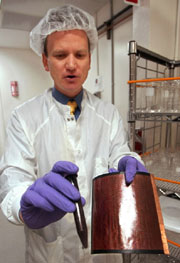|
||||||||||||||||||||||||||||||||||||||||||||||||||||||||||||||||||||||||||||||||||||||||||||||||||||||||||||||||||||||||||||||||||||||||||||

|
|||||||||||||||||||||||||||||||||||||||||||||||||||||||||||||||||||||||
|
|||||||||||||||||||||||||||||||||||||||||||||||||||||||||||||||||||||||
By Terence Chea, Associated Press
PALO ALTO, Calif. — Martin Roscheisen, CEO of
Nanosolar, holds up a plastic vial filled with dark, purple liquid — the
secret ingredient behind a new kind of technology startup that's
turning heads in Silicon Valley.
In a private laboratory here, Nanosolar scientists are designing low-cost solar electricity cells that Roscheisen submits will make solar power competitive with conventional energy sources.
The purple liquid is a nano-engineered material that "self-assembles" into tiny solar cells that convert sunlight into electricity. "We're at the threshold of making solar electricity profitable," says Roscheisen, whose firm raised $6.5 million last year from U.S. Venture Partners, Benchmark Capital and other investors. "We're seeing a lot of interest. We're being contacted all the time by investors." Across the country, venture capitalists are opening their wallets to upstarts that, like Nanosolar, develop "clean" technologies in anticipation of a growing market for products that generate revenue without harming the environment. In 2003, investment in clean technology ventures rose 8% to $1.2 billion while overall venture capital investment fell 14% to $18.2 billion, according to the Cleantech Investor Network. The Howell, Mich.-based group defines clean technologies as technologies that allow for more efficient use of natural resources and greatly reduce ecological impact. Venture capital firms are pouring money into clean technologies related to water purification, agriculture, transportation, manufacturing, recycling, air quality and alternative energy such as solar, wind and hydrogen. "We're getting a bigger and bigger piece of the pie year after year," said Keith Raab, Cleantech's president and chief executive. He expects more than 300 attendees at the Cleantech Venture Forum in San Francisco April 28-30. Among the startups that pulled in the most money last year were Evergreen Solar, a Marlboro, Mass.-based developer solar electricity systems that raised $29.5 million, and Powerspan, a New Durham, N.H.-based maker of pollution-control technology for the energy industry that secured $20 million. Still, some venture capitalists remain wary about investing in environmentally friendly companies after getting burned in the 1980s, when solar and wind energy startups raked in venture dollars, and in the 1990s, when hydrogen fuel cells were hot. Nanosolar was the first green venture investment for Menlo Park-based Benchmark Capital, but general partner Bill Gurley said the decision was motivated more by its belief in the startup's management team than the sector itself. "There haven't been a lot of success stories in the cleantech space," Gurley said. "There's no Microsoft, E-Bay or Cisco that says this is a fertile ground for venture investment." Others believe the latest funding boom is different — that a variety of technological, political and economic forces have converged to make clean technologies ripe for investment. "The fundamental economics suggest there's a good payout for a whole fleet of alternative, renewable technologies," said Kyle Datta, managing director of the Rocky Mountain Institute, a Snowmass, Colo.-based nonprofit that promotes eco-friendly capitalism. The sector has gotten a boost from a new California plan to invest $1.5 billion of the state's pension funds in environmental technologies. State Treasurer Phil Angelides said the "Green Wave" initiative is aimed at helping the state improve financial returns, generate jobs and clean up the environment. "I want to see California in the best position to reap the benefits of this growing sector of the global economy," Angelides said in an interview. The California Public Employees' Retirement System, the nation's largest pension fund, voted in March to invest $200 million in clean technology startups, and agreed this month to pump $500 million into environmentally responsible stocks and mutual funds. "This is just the tip of the iceberg," said the Cleantech Venture Network's Raab. "I think you'll see other pension funds following suit." The market for alternative energy is sure to grow as global oil prices rise, fossil fuels become more scarce, states look for more reliable energy supplies and the United States reduces its dependence on foreign oil, investors say. "There are other people at the table that are changing the supply and demand curve on a global scale," said Erik Straser, general partner at Mohr Davidow Ventures in Menlo Park. "The Chinese and Indian governments are seeking a better way of life for their citizens. To do that they need access to energy." The market for clean technologies also is being driven by increasingly stringent regulations on air, water and energy. And as the Internet, telecommunications and computer sectors mature, venture capital firms with plenty of money to spend are hunting for new markets. On top of that, many corporations are now keen to promote "green" business practices, if only to show they're good corporate citizens. "If you can cut costs and reduce pollution, it's attractive to your investors, employees and customers," said Bob Epstein, co-founder of the nonprofit group Environmental Entrepreneurs. It helps that the sector is attracting more seasoned entrepreneurs such as Nanosolar co-founder Roscheisen, who previously started the Internet firm eGroups and sold it to Yahoo for $720 million in 2001. Nevertheless, many venture capitalists urge caution in investing in "clean tech", given that the sector has many unproven technologies, a complex marketplace and a history of poor returns. "People sell so much on the promise and don't spend enough time on the execution," said Benchmark's Gurley. "You set yourself up for a bubble that can pop." Copyright 2004 The Associated Press. All rights reserved. This material may not be published, broadcast, rewritten or redistributed. |
|||||||||||||||||||||||||||||||||||||||||||||||||||||||||||||||||||||||
